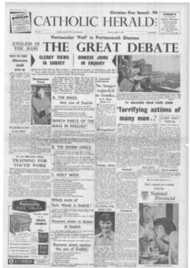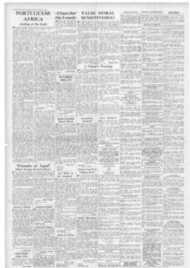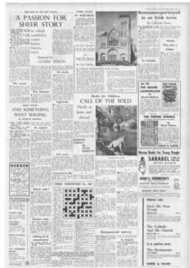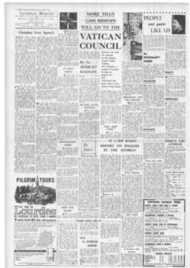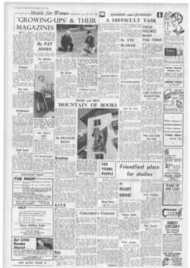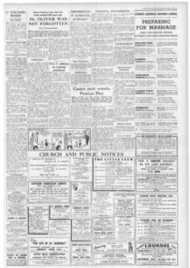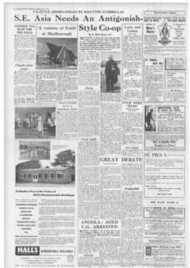Page 4, 7th April 1961
Page 4
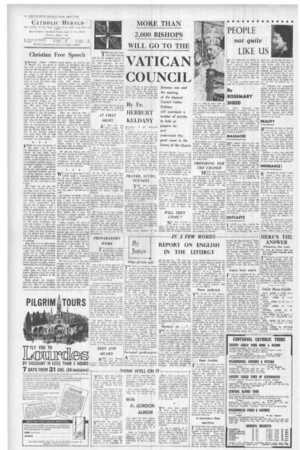
Report an error
Noticed an error on this page?If you've noticed an error in this article please click here to report it.
Tags
Share
Related articles
‘it’s Dangerous To Oversimplify The Council’
Latest C.t.s. Pamphlets
Thorough Is The
Newman's Vision Of The Church
Ecumenical Year
VATICAN COUNCIL
Between now and the opening of the General Council Father Keldany will contribute a number of articles to help us prepare for and understand this great event in the history of the Church.
By Fr.
HERBERT KELDANY
THE Second Council of the Vatican will be the greatest event in the history of the Church in the 20th century. Its consequences will affect not only Catholics and other Christians but also an immense number of souls to whom the name of Jesus is not very meaningful.
Indeed it is because the latter group has 50 much to gain that the Pope is so eager to put an end to the family squabbles which at present divide Christians. Yet John XXIII has repeatedly stated that he counts on the Council which he has called to make plain the message of the Church.
That is why he will not go into conference with his separated brethren until after it has taken place.
AT FIRST SIGHT
AT first sight this seems strange. But when we consider how much has already been gained by way of understanding and explaining the true spirit of the Catholic Church not only to those who do not belong to it but also to those who do. we begin to sec something of what the Pope may expect.
He may not be expecting the definition of a single outstanding point of doctrine but without doubt a number of clarifications and recommendations that can only he for the good of souls and of society as a whole. The very proceedings of the Council will, in his estimate, illustrate the claim of the Church to voice the teaching of the One True God.
In the two years that have elapsed since the Council was first announced the nature and scope of this great gathering, due to assemble in Rome in the coming year, much has become clear. As well as insisting on the importance of Christian Unity the Pepe has spoken of reform within the Church.
"First them must be a reform of the Catholic Church, so that it approximates to the spirit of the Gospel. Afterwards we shall be able to understand our separated brethren, and they will understand us.'' He began in his own diocese with a synod which made plans for new churches, as well as the recruitment and better training of the Roman clergy. Now he is busy extending the same spirited concern to the whole Church, scattered as yet imperfectly over the whole earth, but more widespread than in the time of any of his predecessors.
PREPARATORY WORK
IT is precisely to review this situation and take measures to ensure the development of the Church that detailed enquiries have been sent to all bishops, heads of orders and of universities.
Not only in Rome itself but in all parts of the world Bishops and priests have been collating the facts and recommendations which already fill five large printed books and will soon fill another five, so as to expedite the work of the Council when it meets.
Between seven and eight hundred consultors are engaged in this preparatory work, and though the papers are secret something of their contents is known and will be discussed outside the Council.
To take the composition of the Council. first, we may ask who will they be, these Fathers of the Second Vatican Council, as they will be called? Bishops, of course, for such has long been the custom of the Church, and even in this age of the laity none will be present, though their needs will be much in mind, as we have seen.
But which Bishops, and how many ot them? At least two thousand. and perhaps many more, representing all the races and stages of development in the Church. But even more important. they will be there as the successors of the Apostles in communion with the successor of St. Peter. Such is the Grand Assize which, in the language of the Church, is known as an Ecumenical Council.
SEEN AND HEARD
SOME have thought that after the last Council when the question of the Pope's infallibility was defined
there would be no more Councils. But the calling of this one makes plain that, while the Pope convenes his brother Bishops and ratifies their decisions at the end. he is ever careful to treat them throughout as his Venerable Brethren.
Indeed it would not be a true Council unless he does so, for by Divine Law as well as the provisions of Canon Law they are not only entitled to be present but to be heard in the deliberations.
The greatest number of the prelates in the assembly will be residential, or diocesan. bishops. In addition there will be vicarsapostolic in charge of areas in mission territories, some titular bishops, certain heads of religious orders, the officials of the Roman Curia and, of course, the Cardinals. Many bishops will have their theologians to advise them, but these do not have a vote of their own,
PRAYER, STUDY, WITNESS
THIS vast concourse which is getting ready to assemble will have a dual purpose after all the preliminary prayer and study is done. They have to witness to the Faith of the Church and to judge what is for its good. or otherwise.
Though not in the ordinary parliamentary sense, the prelates will be truly representatives of the whole Church, their discussions will express the continuing influence of the power entrusted by Our Lord to the Twelve Apostles. Nothing will recall the descent of the Holy Spirit at Pentecost more clearly that the presence of Bishops from Africa, India and China in substantial numbers.
What about Bishops of the Orthodox Church? This is one of the most baffling questions, The Greeks and the Latins last sat side by side on an equal footing at the Council of Florence in the 15th century. but though invited none of them took part in the Vatican Council nearly a century ago. That Council also had hoped for the reunion of the Orthodox and the return of the Protestant bodies.
Pope Pius IX issued a letter to all the Bishops of the Eastern Churches not in communion with the Holy See in which he said " We beseech you and pressingly exhort you to come to the said General Council in order that our former love may be renewed and the peace of our Fathers restored . . . " Unfortunately the letter got into the press and this enabled the Patriarch of Constantinople to take exception and return his copy to Rome unopened,
WILL THEY COME?
NO such mistake is likely to be made today, for there are many more experts advising the Commission dealing with the Eastern Churches who are fully in touch with the whole range of their interests. But even so, unless something unforeseen occurs the Orthodox Bishops will probably not come ICI Rome next year.
Pius IX also issued an invitation to all Protestants and other nonCatholics but not to the Church c,f England as such, inviting them to reconsider their position and return to the Unity which their forefathers had abased. But this invitation was not taken up. Instead several statements were drawn up to show why compliance with it was out of the question Nevertheless, one of the leading French Protestants, M. Guizot, wrote as follows: "Pius IX has given proof of admirable wisdom in convoking this assembly from which the saving of the world may come; for our societies arc gravely sick and great remedies are needed for great evils"
PROVIDING FOR THE CHANGE
MUCH has happened since then, specially since the last war, to improve relations between the Holy Sec and the Protestant world, much of which has been drawn together in the World Council of the Churches, It is to provide for this change that John XXIII has created a special Secretariat to promote Christian Unity. This body has as its president Cardinal Bea, the learned German Jesuit authority on Scripture, and as secretary Mgr, Jan Willebrands, a Dutch theologian with considerable experience of ecumenical questions.
A number of Bishops from countries of the Protestant tradition, as well as theologians. make up this important group whose sole object it is to facilitate and speed the union of all Christians, so that there may be in the words of Cardinal Newman " one communion here below as there is but one company in Heaven ".
blog comments powered by Disqus


